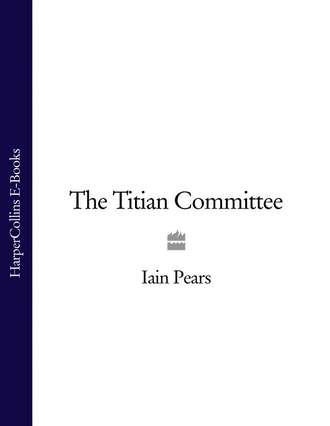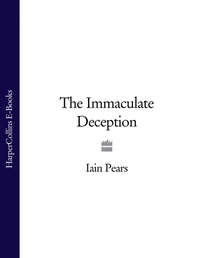
Полная версия
The Titian Committee
And, in the middle, sitting upright at the end of the long wooden table evidently used for meetings, was Professor Roberts. She was sure it was him, although there were three people in the room; whereas the oldest man very much looked the part of the Great Man of his profession, complete with silver hair, tweed jacket, aquiline nose and aristocratic bearing, the others could never pass as great anythings.
Professor Roberts would, on balance, have approved of Argyll’s brief summary of him as being largely accurate. He was a man who had learned early in life that you cannot arrange matters so that everybody loves you simultaneously. That being the case, the best you can do is to ensure that those who dislike you can do you no harm.
This golden rule he had followed since he had formulated it about a quarter of a century previously, but it should not be taken as the mark of an unpleasant man. Far from it. Roberts had a great reputation for his civility, his hospitality and his grace. An entire generation of young scholars referred to him in awed tones because of his immense knowledge and his kindness to students. As Argyll had said, he valued his reputation for integrity, and worked hard to preserve it.
Flavia’s identification was, of course, correct. Roberts introduced himself in the way of someone conferring a favour, and brusquely introduced the other men – who seemed very much less at ease – as his colleagues on the committee, Dr Miller and Dr Kollmar. From there on he made it clear that he was the one who was going to do all the talking, not that the others showed the slightest sign of wanting to intervene.
Flavia went through all the standard preliminaries, paying attention more to the way he answered rather than to what he actually said. The facts she knew already: he’d been on the committee since it was founded, held a chair in England, had published this, that and the next thing. All standard and uninteresting. She also sneaked a look in her notes to remind herself about the other two. Kollmar a German and on the committee since it was founded. Miller another American, more junior, job at a college in Massachusetts, where he was due to come up for tenure next year.
‘Coffee?’ Roberts asked, gesturing at an eighteenth-century silver pot in the corner.
While he was pouring, she examined the pile of notes on the desk. There was nothing else to do; the others didn’t seem to want to take up the conversational slack. There was one book, and she picked it up.
‘This is Masterson’s, isn’t it?’ she said, reading the cover.
Roberts gave her a penetrating look from behind the coffee-pot, and then relaxed. ‘That’s right. I borrowed it from her on Wednesday. I needed to refer to some parts for an article I am writing. There are some excellent passages in it.’
A bit of a back-handed compliment, she thought. It looked deadly dull stuff to her. Still, part of her job as an artistic expert. She’d get Argyll to have a flip through; it would do him good to read something serious for once. She asked if she could take it, as it should be with Masterson’s other possessions for return to her next of kin.
Roberts was disapproving. ‘I would much rather you didn’t,’ he began. ‘I still need it.’
Flavia suggested that she thought Masterson’s murder might be slightly more urgent a matter and he took the hint, reluctantly but with grace.
‘But of course. Extraordinarily selfish of me. I confess I still can’t believe she is dead. But do take it. I can survive without, I’m sure.’
There was a scuffle from Kollmar, the first real sign of life the man had shown. He was perhaps ten years younger than Roberts, but seemed half a decade older. He looked as though life had not been hugely kind in its dealings with him. Short and wiry, with a pinched face lined by years of preoccupation and worry. He was scruffily but passably dressed and Flavia instantly put him down as one of life’s victims. Not, of course, she reminded herself with an upsurge of professionalism, that this implied innocence. Or even that he was pleasant.
‘I was wondering –’ he began.
‘Oh, indeed. Indeed,’ Roberts interrupted as he came over with Flavia’s coffee-cup. ‘Thoughtless of me. Please do go. I’m sure that will be all right. Perhaps you can get the results round to me this evening? I really need that information quickly.’
He turned his attention to Flavia. ‘Dr Kollmar is in a great hurry to get to the library to do some work. That won’t cause you any problems, I’m sure.’
It clearly wouldn’t make any difference if it did, she thought as the German picked up his briefcase and scurried off. In fact, she was a touch irritated, both because she would now have to go and see the man separately, and because Roberts had so effortlessly taken charge and organised matters for his own benefit. She felt sure that all Kollmar was going to do before he was interrupted and sent off was to ask for a cup of coffee himself. Still, interesting. There was no doubt who was the head of this little band of brothers.
That little task accomplished, Roberts handed over her coffee and sat down once more, arranging himself into the same pose of authoritative elegance she had noticed when she first walked in.
‘It occurred to me to wonder,’ he murmured quietly, ‘which one of us you suspect. Am I, for example, on your list?’
He said it in a way clearly designed to indicate that he considered the idea ludicrous, but Flavia thought she could just detect a flicker of concern, deep below the surface. Far more obvious was the anxiety that Miller demonstrated at a remark that was probably designed only to catch Flavia off-balance. Miller was very much upset. In fact, he looked as though he was about to be sick.
‘What makes you think that we suspect any member of the committee? Surely Commissario Bovolo has told you –’
‘About his Sicilian. Yes, and of course that’s comforting, even if it is nonsense.’
‘Why do you think that?’
‘Louise was an American. She’d lived for years in New York and knew very well how to take care of herself. She was a very determined and confident woman. Not the sort of person who’d be caught like that.’
‘Does this mean you would like to implicate one of your colleagues?’ she asked.
‘Good heavens, no,’ he said, evidently shocked at the very thought of doing something quite so vulgar. ‘I have not the slightest idea who killed her. But it occurred to me that you might wonder if the killer may have had a better reason than theft.’
‘Which you did not.’
Roberts inclined his head. ‘Which I did not. Nor, I must add, did anyone else I know. In my case it was quite the opposite, in fact. I rather saw her as my own protégée.’ He smiled as he spoke. ‘Although, of course, Louise was much too proud and independent ever to accept such a subservient role with anyone. Which was why we had our differences of opinion that, alas, were not resolved before her death.’
‘What was she like?’
‘How do you mean?’
‘As a historian, a person, a colleague. Liked? Admired? What?’
‘That, of course, depends on who you ask,’ Roberts said, unknowingly echoing Argyll’s own words about him. ‘As far as her work went, she showed very great promise indeed.’
Again, a touch of condescension towards a woman in her late thirties. ‘Personally,’ he went on, ‘I never had any cause to regret recommending her for membership. She was briefly a pupil of my great friend Georges Bralle, and that was more than good enough for me.’
Miller gave a faint snort, and Flavia looked at him enquiringly. Roberts, she noted, also gazed at him, although with a more disapproving air.
‘Well,’ Miller began reluctantly, evidently uncertain whether he was about to step out of line and still not entirely recovered from the nasty shock that Roberts had given him with his opening remarks, ‘that’s not exactly true. She was at Columbia with me and took off for a year to live in Paris. She had enough family money to do that sort of thing. She joined Bralle’s classes, and came back a year later with a reference from him. On the strength of that she got her job and never looked back.’
Flavia noted the comment, which didn’t exactly brim over with affection and regret, but decided to ignore it for the time being. She turned her attention back to Roberts. ‘She joined about eighteen months ago, is that right?’
He nodded again. ‘Yes. Because Dr Bralle retired. Do you know the story of the committee, by the way?’
She shook her head.
‘It was formed as a sort of private venture twelve years ago. By Bralle, with myself and Kollmar. We were both the great man’s pupils. Van Heteren joined a few years after, Miller here about five years ago. We burrowed away as best we could and then we were, so to speak, nationalised.’
‘I beg your pardon?’
‘Taken over by the state. We were working on our own, on a shoestring and basically couldn’t afford it any more. Then the Italian Arts Ministry decided it wanted to fund a prestige project and offered us vast subsidies and official status. I negotiated the arrangement, which came into operation a few years ago.’
‘Very nice for you.’
He didn’t seem so grateful.
‘The money was very useful. But a lot of bureaucracy comes with it, of course. Bralle didn’t like the idea much and decided to retire. Naturally, an Italian had to be appointed to the committee – Dr Lorenzo, who joined us two years back. As we had more money and the pointed desire of the Arts Ministry for something to show for it, we had to step up the workpace and settled on Dr Masterson to help.’
There was something in his tone which suggested that the changeover wasn’t quite the smooth and amicable operation that was laid out. ‘And Masterson didn’t turn out as well as you thought?’
Roberts paused to weigh his words. Flavia sensed that he was trying to finetune his message – maliciousness with the appearance of objectivity. She found herself not liking him as much. ‘I had no complaints,’ he said with careful emphasis.
‘But…?’
‘Let us say that she was fairly young and inexperienced. She would, of course, have settled in and become indispensable once she’d got the hang of how we proceeded. Some of my colleagues, I think, had less faith than I did.’ It was extraordinary the way he talked as if Miller wasn’t even in the room.
‘You don’t think you made a mistake in recommending her, in other words.’
Roberts was not the sort of man who ever admitted to making a mistake. Either that, or he believed in loyalty. ‘Goodness, no. She brought conscientiousness and enthusiasm, but she did need a bit more practice in the technique of committee work. And, of course, she didn’t always express herself as tactfully as she might have.’
All these little hints. Why on earth could people not be direct? Discretion was one thing, but it could be carried too far.
‘What exactly do you mean, Professor?’
‘Well. To take one example. I might as well mention it as you are bound to hear the tale eventually. Do you, by any chance, know how we go about our task here?’
Flavia shook her head. She’d had to master a considerable amount of detail in the past twenty-four hours; the minutiae of art historical collaboration was not amongst the information given high priority. It was, unfortunately, an excuse for a major diversion.
As Roberts explained it, their method was very simple. Each member of the committee was allotted a picture to study, either alone or in collaboration, and wrote a report. This was discussed at their annual meetings and the committee then voted to assign the work a rank. ‘A’ meant a genuine Titian, ‘B’ was uncertain and ‘C’ meant definitely not genuine. Those deemed ‘A’ were then subjected to further scientific tests to check for mistakes. The individual reports and assessments were then slowly accumulated and produced in a series of expensive, glossily illustrated volumes.
Flavia became increasingly surprised as he explained. ‘Do you really mean to say that most of you vote on whether a picture is genuine or not without even seeing it?’
‘Yes. In most cases it is quite unnecessary. Titians are spread all over the globe and we can’t all go running around looking at each and every one. Besides, since we accepted state money we have been put under steady pressure to produce what the ministry likes to call value for money. It’s this new and competitive age we live in, as Dr Lorenzo keeps on telling us. An appalling state of affairs.’
‘So how long do you spend on each picture?’
‘Examining it, you mean? Oh, that depends. Often a couple of hours is enough.’
‘That’s ridiculous. It seems very rushed to me. This is meant to be a definitive study, isn’t it?’
Roberts shrugged. ‘I assure you it is more thorough than most such projects. We have several hundred pictures to study and we are all getting older. The point I was getting at is that at Louise’s first meeting Dr Kollmar recommended that a picture in a Milanese collection be rated “C”. It was a picture I had examined, with Dr Kollmar doing the archival research. I had no definite opinion one way or the other, but Dr Kollmar concluded the documentary evidence was inadequate. Everybody agreed to accept his judgement, except Louise. She had also agreed initially, then turned round the next day and caused a fuss.’
Конец ознакомительного фрагмента.
Текст предоставлен ООО «ЛитРес».
Прочитайте эту книгу целиком, купив полную легальную версию на ЛитРес.
Безопасно оплатить книгу можно банковской картой Visa, MasterCard, Maestro, со счета мобильного телефона, с платежного терминала, в салоне МТС или Связной, через PayPal, WebMoney, Яндекс.Деньги, QIWI Кошелек, бонусными картами или другим удобным Вам способом.







